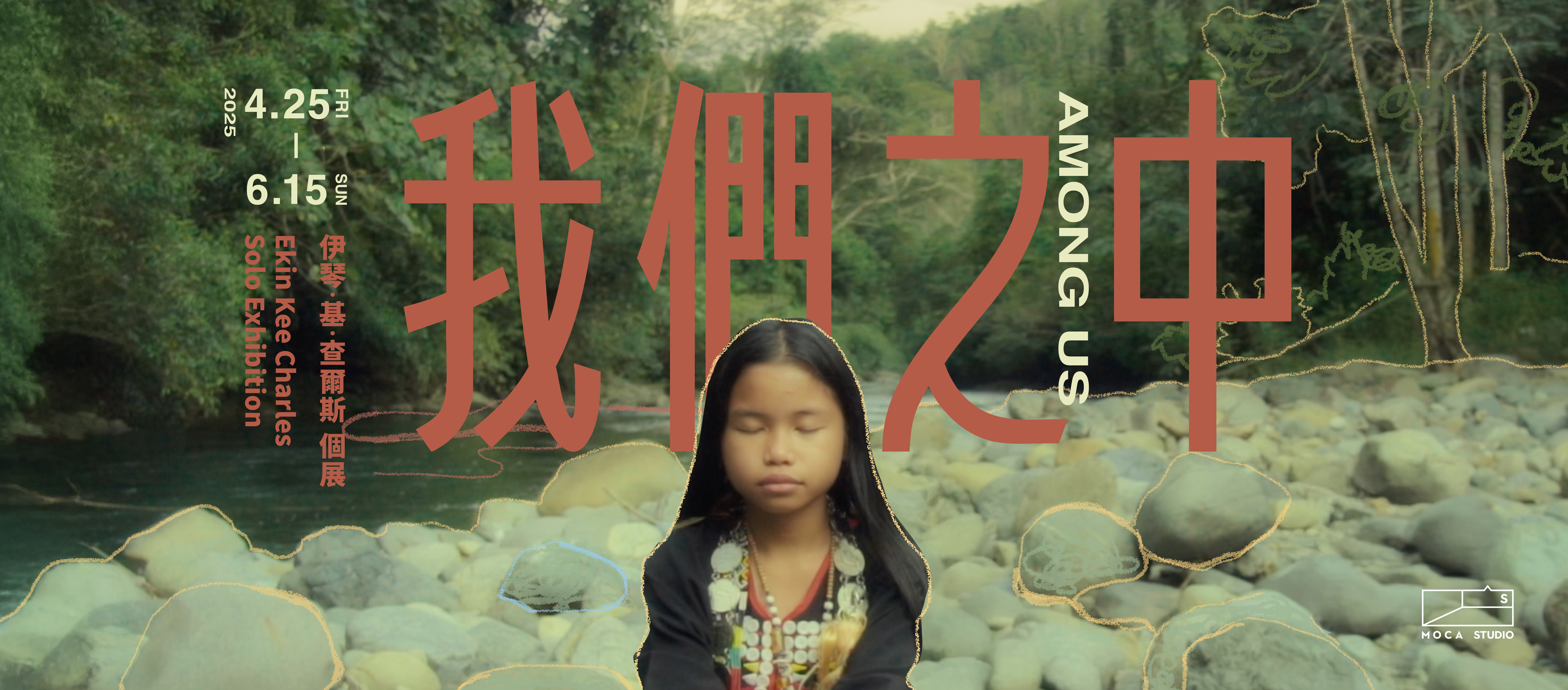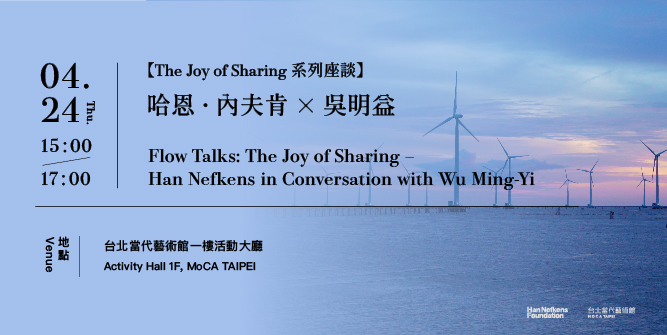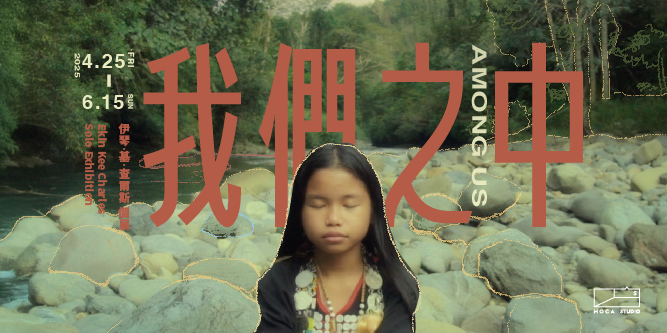

Museum of Contemporary Art, Taipei
Sunday Sunday
10AM - 6PM



Sunday Sunday
10AM - 6PM
EXHIBITIONS & EVENTS

2025 / 04 / 25 Fri.
2025 / 06 / 15 Sun.
10:00 - 18:00
Artist
Ekin Kee Charles
Supervisor
Department of Cultural Affairs, Taipei City Government
Organizers
Taipei Culture Foundation
MoCA TAIPEI
Grant Support
Han Nefkens Foundation
(Loop Barcelona Video Art Production Grant 2022, in collaboration with the Fundació Joan Miró, Barcelona; MoCA TAIPEI; ILHAM Gallery, Kuala Lumpur; Center d'Art Contemporain, Genève; Art Hub Copenhagen, and Inside Out Art Museum, Beijing.)
Annual Sponsors
THERMOS
Contemporary Art Foundation
Hui-Neng Chi Arts and Culture Foundation
Royal Inn
Annual Sponsor for Appointed TV/Screen
SONY
Media Cooperation
Radio Taiwan International
Identity and community value has been a recurring theme in Ekin Kee Charles’s works. The works — Rama Rama and Meet Us at the Ridge: 6.0753° N, 116.5588° E, are an exploration of identity in the context of traditional custom. How do we play our role in preserving and carrying on our traditions?
The exhibition name, Among Us, chosen by the artist, is based on the concept of a mobile game that became popular during the pandemic. The concept of the game involves playing as cute-colorful animated bean-like characters in space, working together with your crewmates to identify the suspected impostors, who are then eliminated through voting by questioning each other’s sincerity. “While I was doing research for both works, most of my sources were from my family members, my uncles and aunties. I am not disputing their points, nor am I giving them the benefit of the doubt; however, they were portraying based on their perspective and beliefs. Similar to Among Us, I question the value of truth and sincerity.”
This series of works explores the artist’s journey in questioning a deeper connection between herself and what it means to be indigenous in the current society of vast modernization. Internalizing a worry of the fading customs, the artist interprets the profound foundation of their disappearance, as they are honored on a surface level without truly understanding the meaning behind them. This series serves its way of preserving thoughts on custom tied by specificity of life experience.
“Most of my work revolves around the community that raised me; what I witness reflects how I express myself as an artist. The journey has never been easy; as I question myself correspondingly, I question the people around me. This process will lead me towards a multilayered complexity of emotions. By making these films, I am able to express my thoughts as my way toward acceptance and not leaving them behind.”
MORE
LESS
Ekin Kee Charles is an indigenous filmmaker from Sabah, Malaysia. She is a descendant of the Kimaragang tribe, a sub-tribe from the Kadazandusun Dayak umbrella. Ekin grew up in a closed community that consisted of family members who migrated from the inland mountain area to Kota Marudu, Sabah. Her works are often set around the community and lifestyle of the people in her hometown, oftentimes including them as cast and crew in her projects. Ekin has shared her passion for film through workshops conducted for indigenous communities not only in Sabah, but also in other parts of Malaysia.
By Futuru C.L. Tsai
Director, National Museum of Prehistory, Taiwan
Professor, Ph.D. Program in Austronesian Studies, National Taitung University
Ekin Kee Charles, an indigenous filmmaker of Kimaragang descent from Malaysia, has showcased two short films at the Museum of Contemporary Art, Taipei (MoCA TAIPEI): Meet Us at the Ridge: 6.0753° N, 116.5588° E (2024/8 minutes) and Rama Rama (2021/16 minutes). The narrative and cinematic language of these two films employ a style that is both poetic and grounded in the everyday. They gently yet profoundly reflect on her community’s oscillation between tradition and modernity, forming a kind of “cultural activism” that, while sharing commonalities with many other Indigenous films, remains distinct in its expression.
Faye Ginsburg, an anthropologist at New York University, proposed that indigenous media functions as a form of cultural activism. She observed that indigenous and marginalized communities employ media, art, and cultural practices to interpret, reconstruct, and preserve their cultures, serving as a resistance to oppression or assimilation by the dominant society. While Ekin Kee Charles’s two films, like many indigenous works, interpret her native culture through the art of cinema, they differ from traditional indigenous media that emphasize cultural activism. Rather than overtly opposing the dominance of mainstream society, these works dwell more deeply in the director’s inner reflection, allowing the wounds of her culture to speak through poetic imagery and narrative.
Ekin’s exploration of her cultural activism through film stands apart from the works of many Taiwanese indigenous directors. Taiwanese anthropologist Hu Tai-Li (胡台麗), who examined films by these directors presented at the Taiwan International Ethnographic Film Festival between 2001 and 2019, pointed out that most of their works focused on exposing mainstream stereotypes and misconceptions about indigenous peoples while downplaying conflicts and vulnerabilities within indigenous communities to foster a positive public image. Such a distinction may arise from differing social contexts: Sabah, as part of Malaysia, has a highly diverse ethnic population, with over thirty indigenous groups forming the majority. Although they nominally enjoy autonomy and protection of rights, they continue to confront federal pressures concerning cultural erosion and environmental destruction. In contrast, Taiwan’s indigenous communities constitute only about 2.5% of the overall population and face more severe obstacles to cultural preservation and social identity within Han-dominated political and economic systems.
Both of the artist’s short films are seen through the eyes of a young girl, blending common everyday scenes with rich symbolism. In Meet Us at the Ridge: 6.0753° N, 116.5588° E, the girl and her companion talk about the depth of a river – a world they long for yet fear, which mirrors their quest for tradition. Dragging a heavy buffalo head, she journeys along a muddy mountain trail, eventually placing it before a jar coffin. This powerful image, echoing the initial scene of a buffalo being slaughtered and the girl’s expressive gaze, evokes a strong tension between life, death, and legacy. Meanwhile, the contrast between fireworks and the mesmerizing world of grown-ups is set against a quiet, pensive woman, highlighting the internal conflict amidst cultural disruption.
In Rama Rama, layers of symbolism unfold: a boy’s comment on a girl’s missing tooth, whispered conversations between a mother and an aunt, the turning on and off of a faucet, a cookie box left half open, the making of traditional garments, and the shape of a sand pile—each seemingly trivial snippet is intricately woven into a nuanced emotional narrative about memory, oblivion, and the act of seeking. Instead of providing clear statements or judgments, the cinematography allows meaning to emerge naturally, as if nothing is explicitly stated, yet everything is implied.
It is worth mentioning that symbolic objects have always been employed as a means of storytelling in films. In Meet Us at the Ridge: 6.0753° N, 116.5588° E, the buffalo head serves as a prominent symbol. It reveals a cultural parallel between the Ekin’s Kimaragang tribe, a sub-tribe of the Kadazandusun Dayak, and Taiwan’s Austronesian indigenous peoples, who engage in similar sacrificial rituals. In numerous Austronesian cultures, skulls carry significant symbolic weight in sacrificial rituals and ancestral beliefs; they often signify power, life force, and ancestral strength. This belief is widely held among Taiwan’s indigenous peoples, Southeast Asian islanders, and various Pacific Island nations. In such a ritual, the skull as a sacrificial item embodies the power of ancestors, life, and the community’s memory and acts as a critical medium linking humanity to the spiritual realm, social relations, and the past. While pigs are commonly used as ritual offerings among most indigenous groups in Taiwan, the Kimaragang people in the film predominantly use water buffalo instead. Furthermore, the Kimaragang believe that spirits return to the paradise-like realm that is Mount Kinabalu after death, and the coordinates in the title of the film represent this. Similarly, Taiwan’s Paiwan people believe the deceased ascend to Mount Beidawu, where they reunite with their ancestors eternally. Despite residing on different islands, the shared Austronesian heritage fosters cultural connections between the Kimaragang and Taiwan’s indigenous peoples.
Lastly, these two short films, whether in terms of artistic expression or reflection on one’s culture, exceed expectations in depth, especially considering their brief lengths. Through Ekin's tender and poetic perspective and imagery, we not only witness the indigenous peoples of Sabah but also the broader Austronesian world and, ultimately, our own reflections on the shifting borders of culture.
活動名稱
活動地點
活動時間

Activity Hall 1F, MoCA TAIPEI
2025/04/24 Thu.
15:00 - 17:00

Activity Hall 1F, MoCA TAIPEI
2025/06/07 Sat.
14:00 - 16:00
CLOSE
CLOSE
Copyright Notice
MOCA Taipei holds a high respect for the copyright of others, and it is stated in MOCA Taipei’s terms of service that any user of the museum’s service shall not infringe on others’ copyright. Therefore, MOCA Taipei hereby ask all our users to respect others’ copyright. If you think any of the content on MOCA Taipei’s website or anyone using MOCA Taipei’s service has infringed on your copyright, we strongly advice to you to file a complaint according to the regulations stated below, and MOCA Taipei customer service center will initiate related procedures as soon as possible.
If any of the content on MOCA Taipei’s website or anyone using MOCA Taipei’s service
has infringed on your copyright, please fill out the “Copyright Infringement
Notice,” provide the information and statements listed on the notice, and send them
to MOCA Taipei via fax.
1. Signature of the copyright owner or the signature of the proxy of the copyright
owner; document proving the ownership of the copyright and the copyrighted contents,
i.e. the cover and related pages of a publication, print-outs of webpage contents
and the URL.
2. The webpage and URL containing the contents that cause the copyright
infringement.
3. Your contact address and phone number.
4. A written statement stating that you believe the use of the webpage content is
without the consent of the copyright owner, the proxy of the copyright owner, or the
authorization of the law.
5. A written statement confirming that the information you state in the notice is
truthful and you hereby make the statement as the copyright owner or the proxy of
the copyright owner.
1. MOCA Taipei will remove the webpage content claimed to cause the copyright
infringement as soon as possible after receiving your notice, and will inform the
user about the infringement via email. If the said user objects to said
infringement, MOCA Taipei can provide your name, email or phone number to said user
so that direct communication can be achieved to resolve the dispute.
2. According to MOCA Taipei’s privacy policy and related regulations, MOCA Taipei is
only allowed to provide a user’s personally identifiable information to a third
party by the request of the law or a governmental agency unless said user agrees or
for the purpose of providing a service. Therefore, when you file a report, MOCA
Taipei will only remove the contents causing the copyright infringement, and will
not provide you any personally identifiable information of said user. If you wish to
obtain the user’s information, a legal proceeding must be filed at the District
Prosecutor’s Office or the Criminal Investigation Bureau, who will issue an official
letter to MOCA Taipei requesting the user’s information. In the case, MOCA Taipei
will comply accordingly.
Privacy and Data Protection Policy
MOCA Taipei values user’s privacy very much and has implemented the following privacy and data protection policy, which is listed below for your reference.
The privacy and data protection policy includes MOCA Taipei’s management of personal
identifiable information collected when providing users the website service as well as MOCA
Taipei’s management of any personal identifiable information shared between the museum and
our business partners.
The privacy and data protection policy is not applicable to any enterprise other than MOCA
Taipei, nor does it apply to those that are not staff or managements employed by MOCA
Taipei.
When you register a MOCA Taipei account, use MOCA Taipei’s products or services, browse MOCA
Taipei’s website, take part in related promotional activities or gifting programs, MOCA
Taipei will collect your personal identifiable information. MOCA Taipei is also allowed to
obtain said information from our business partners.
When you register a MOCA Taipei account, you will be asked to provide your name, email, date
of birth, sex, work title, field of profession and personal interests. Once your
registration is successful and the account is successfully logged into for the use of our
service, we will be able to recognize you.
MOCA Taipei also automatically receive and record the server data on your browser, including
IP address, the information in MOCA Taipei’s cookie and the record of visited webpages.
MOCA Taipei uses the information for the following purposes: to improve advertisement and
webpage contents provided for you, to complete your request for a certain product and to
notify you about a special event or new project.
MOCA Taipei will not sell or loan your personal identifiable information to anyone.
In the following circumstances, MOCA Taipei will provide your personal identifiable
information to a governmental agency, an individual or a company.
To obtain your consent before sharing the information with other individuals or companies.
To provide a requested product or service, which requires sharing your information with
other individuals or companies.
To provide a requested product or service, which requires providing the information to
companies providing the product or service on behalf of MOCA Taipei. (Without our notice in
advance, these companies will not have the right to use the personal information we provided
for purposes other than provide a product or service.
To abide the law or the request of a governmental agency.
When an action on the website violates MOCA Taipei’s terms of service or the specific user’s
guidelines of a product or service.
Other information required to be disclosed by the Computer-Processed Personal Data
Protection Law or other regulations.
To protect user’s privacy and personal data, MOCA Taipei is not allowed to look up other
user’s account information for you. Should you need to look up someone else’s information
due to legal issues, please contact the police to file a legal proceeding. MOCA Taipei will
fully cooperate with the police to provide necessary information to assist with the
investigation and solve the case.
MOCA Taipei will access your computer setup to extract MOCA Taipei’s cookie.
MOCA Taipei allows the companies that place advertisements on the museum website to access
your computer setup and extract cookies. Other companies will follow their own privacy and
data protection policies to use cookies instead of MOCA Taipei’s policy. Other advertisers
or companies are not allowed to extract MOCA Taipei’s cookie.
When MOCA Taipei conducts tasks related to our products and services, web beacons are used
to access our website network to use cookies.
MOCA Taipei’s users have the right to revise their personal MOCA Taipei account information
and set up personal preferences anytime, including the option as to whether you would like
to receive notifications about special events or new products.
Based on the Computer-Processed Personal Data Protection Law, when the purpose of using your
personal information expires, MOCA Taipei will provide the service to delete your account
and data. However, to do so, please contact us via telephone.
MOCA Taipei adopts a method that conforms to the Computer-Processed Personal Data Protection
Law to protect your personal information.
To protect your privacy and safety, the data in your MOCA Taipei account will be
password-protected.
Under some circumstances, MOCA Taipei uses the standard SSL security system to ensure the
safety of data transmission.
MOCA Taipei has the right to revise our policies at any time necessary. When the regulations
regarding using personal information are extensively revised, public announcements will be
made on our website to inform you about the revisions.
Please tell us your ideas and suggestions here.